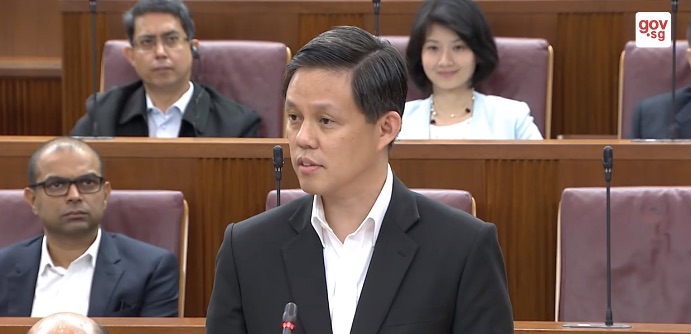By Philip Ang
Our Singapore government has unique powers to redefine just about everything.
Besides pseudo ownership of HDB flats and our CPF, we also have pseudo-cooperatives such as NTUC Income.
NTUC Income Insurance Co-operative Limited is the only insurance cooperative in Singapore. It provides life, health and general insurance products. It currently has seven branches and five lite branches across Singapore
A cooperative is defined as an organisation or business jointly owned and operated by members for their mutual benefit, ie lower premiums for insurance policyholders or higher bonus rates.
In the case of NTUC Income, it is operated by PAP-appointees to make obscene profits for shareholders. For an example of political appointees, Minister in the Prime Minister’s Office, Mr Chan Chun Sing is currently the Secretary-General of the National Trades Union Congress (NTUC).
NTUC Enterprise Co-operative Limited holds NTUC FairPrice, NTUC Foodfare, NTUC Income, NTUC Health, NTUC First Campus, NTUC LearningHub, NTUC Link.
With slightly less than 50% shareholding, the government is the biggest shareholder.

For an insurance company, NTUC Income has been generating obscene profits, thanks to our population policy as well as being the few companies that are tasked to run mandatory policies and automated policies such as Eldershield.
I have been an NTUC Income shareholder – not a member of a real cooperative – for more than a decade and benefited from its dividend policy as much as the government.
Last year’s dividend rate was 6% …

and since 2005, the dividend rate has been almost unchanged.

Income is actually no different from other insurance companies such as Great Eastern Life whose main objective is to serve shareholders.
In order to serve shareholders, NTUC Income even decided to reduce policyholder bonus by a whopping 45% permanently in 2008.
Back in April 2008, NTUC Income announced a re-structuring of the bonus with respect to life policies incepted after 1993, by decreasing its annual bonus from 2.3% to 1.3% of the sum assured and increased its special bonus from 25% of accumulated bonus (for policies of more than 15 years) to 30-120% (for policies ranging from 20 years to 2 years).
It claimed that the policyholder benefits are not impacted by the re-structure. But this allowed Income to maintain a high dividend payout to its political master while policyholders were ripped off.
Hmm .. daylight robbery again?
This issue was highlighted on former Income chief Tan Kin Lian’s blog and published on TOC (below). Tan’s blog post has since been deleted.

Any recourse for consumers when the consumer watchdog, CASE is also affiliated to PAP with PAP MP, Mr Lim Biow Chuan as its president?
But recent profits pale in comparison with those prior to 2005 which had allowed Income to issue bonus shares besides maintaining a high dividend payout.
From 2001 to 2004, Income issued bonus shares of between 3% and 12%. Before the turn of the century, it was even higher at 15%.

Income’s kitty had already been emptied into shareholders’ pockets and that’s a reason for policyholder bonus to be drastically reduced.
Who was Income serving? Did ‘cooperative’ members benefit from paying high insurance premiums? Should shareholders receive 6% dividends plus bonus shares while policyholders an average return of 1%?
Government-linked companies, including Temasek, love to trumpet their ‘contributions’ to the community. Bear in mind they have been ripping off residents and the sources of their ‘contributions’ are from our pockets.
NTUC Income should not call itself a cooperative because its main objective is to profit shareholders, especially PAP.
PS: Government Linked Companies derive their obscene profits from an exponential increase in the population and our costs of living. Without creating artificial demand by growing the foreigner population, government-linked companies will likely start to collapse.
TOC has written to NTUC Income for their comment on this matter and will include their response when they reply.
Editor’s note – For those who are not aware, in Singapore, cooperatives do not have their annual reports open to the public. Even if you want to buy to see their info, it is impossible. We have tried to seek information on cooperatives in Singapore before but was told that the information must come from the cooperatives themselves and no information can be revealed.
Explanation for NTUC’s restructure of bonus rates in 2008
“The re-structuring means that we do not have to put aside as much money to reserve for the annual bonus, and instead we are able to leave more money in the life fund. As the life fund can withstand changes in the investment markets better, the current structure gives us better solvency, flexibility and strengthens the financial position of NTUC Income.
While we aim to keep our yields in line with our past practice, we do not wish to build in annual bonuses which prevent flexibility. This strengthens the position of the life fund for the benefit of all.
In other words, we put more into variable (special) bonuses instead of basic or fixed (annual) bonus. Our overriding intention is that the combination of special and annual bonus will give a return in surrender value or death claim equal to what was intended in the past, is competitive and in line with our future investment returns. This bonus structure is in line with industry practice and widely regarded as prudent actuarial practice.
Our 2007 investment returns were good. However, we do not distribute bonuses based on one year’s returns alone. To ensure long term sustainability, we look at moving averages over five or ten year periods.
Declaring a return of 5-6% for most of our policies maturing today is fair and in line with experience. It would not be financially sound to hike up returns for 2007 simply because the actual return for 2007 was 10.7%.”







